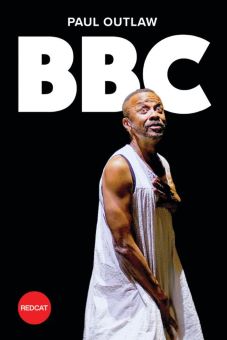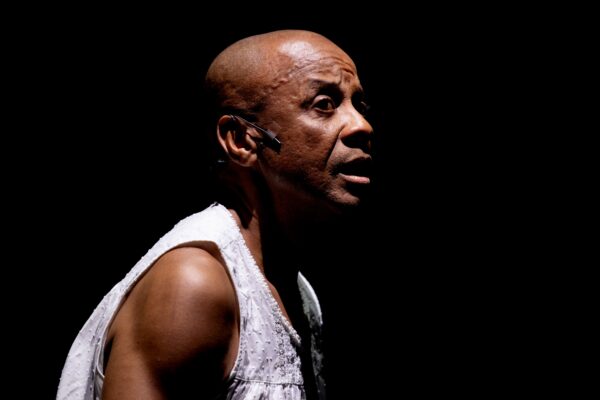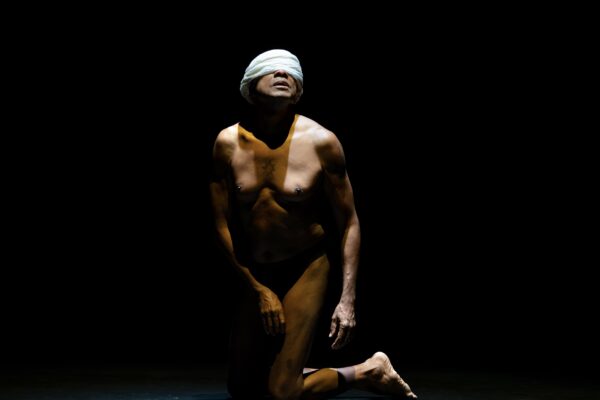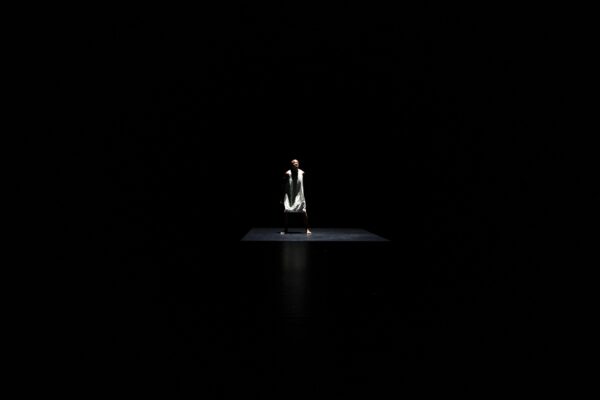What Happens When a Right-Wing White Woman
Wakes up Trapped in the Body of a Black Man?
LA’s beloved and acclaimed writer and theatre performer Paul Outlaw presents his latest work BBC (Big Black Cockroach) at REDCAT in downtown Los Angeles. This outrageous and provocative world premiere begins tomorrow June 20 and runs through June 22, 2024.
Directed by Sara Lyons, this nightmarish satire in which a right-wing American white woman wakes up in the body of a Black man mixes a disorienting cocktail of historical violence and near-future visions. Innovative design elements echo the expanding identities within the protagonist as the production’s indelible central image — a queer Black male body in stark isolation — becomes the vessel for America’s violent past, present, and future. Projections by Hana S. Kim (Tony Winner for The Outsiders), lighting by Chu-hsuan Chang, stage management by Lanae Wilks, and the spatialized sound design — built entirely from recordings of Outlaw’s voice and movements — is by Jonathan Snipes.
photos by Angel Origgi courtesy of REDCAT
BBC (Big Black Cockroach)
produced by OutlawPlay
co-producer / production manager Brooke Harbaugh
REDCAT (Roy and Edna Disney/CalArts Theater)
631 West 2nd St (under Disney Hall)
Thurs June 20-Sat June 22 at 8:30
for tickets, call 213-972-8001 or visit REDCAT
A clever inversion of Kafka’s The Metamorphosis. BBC was also inspired by classical European mythology, superhero fantasies, and the current uncertain social and political state of the U.S. Outlaw’s artistic sources are:
- King David, Psalm 23 (Bible), around 100 BCE
- Sophocles, Οιδίπους ΤÏÏαννος (Oedipus the King), 429 BCE
- Ovid (Publius Ovidius Naso), Metamorphoses, 8 CE
- Lucius Annaeus Seneca, Oedipus, 1st century CE
- Franz Kafka, “Ein Traum” (“A Dream”), 1914-16
- Franz Kafka, Die Verwandlung (The Metamorphosis), 1915
- Verbatim statements from U.S. politicians currently in office or campaigning
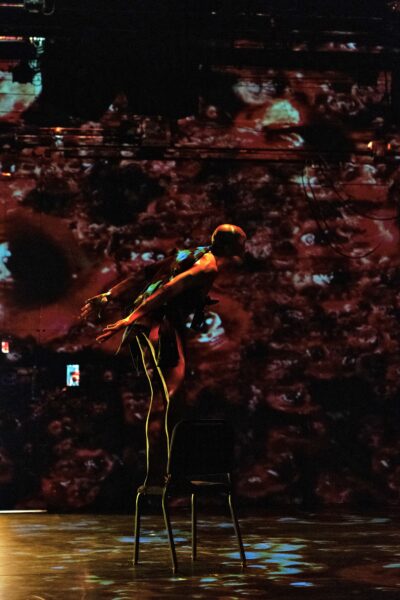
“I believe in the transformative power of live performance,” states Outlaw.
“I am a shapeshifter and a griot: a transformer and a storyteller, a chameleon and a historian. I tell the stories, fears and dreams of my ancestors and my contemporaries, and in those stories I take on multiple roles. I am male, I am female; I am Black, I am white; I am young, I am old; I am you, I am me.
The struggles of people of color and queer folk inspire and inform my work, which I perform in churches, terminals, parks, nightclubs and galleries — and yes, sometimes even in traditional theaters. This multiplicity of venues supports my challenging of the conventional relationships in a live performance. Who is the audience? Who is the performer? Who’s watching whom?
My plays and performances have been called one-man shows or solo performances, but I prefer to describe them as collaborative ensemble pieces performed by one visible artist.
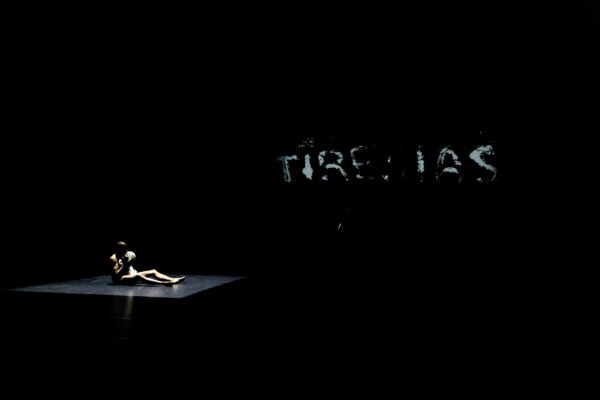
All of these themes and considerations come together in my latest project, BBC (Big Black Cockroach), which I began writing during the eruption of social unrest at the end of the Trump administration and continued to develop during the uncertainty of the global pandemic.
The first sentence of Franz Kafka’s Die Verwandlung (The Metamorphosis), 1915: “When Gregor Samsa awoke in his bed one morning from unsettling dreams, he found himself transformed into a monstrous vermin.” From Book 3 of Ovid’s MetamorphÅsÄ“s, 8 AD: “Strolling in a verdant grove, Tiresias saw two serpents coupling. When he smacked them with a stick, they separated and slithered away. At that moment he was transformed from a man into a woman for the next seven years.”
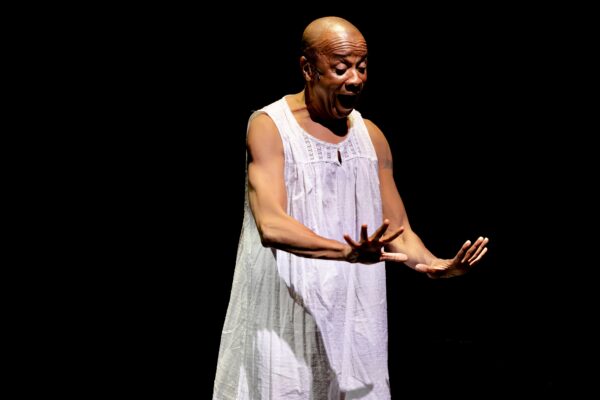
In creating the various iterations of this project, I’ve explored multiple modes of performance’” silent film acting, audio drama, naturalism, theater of the absurd, standup comedy and storytelling’”while shifting between embodying tropes of Black manhood and white womanhood. These dissociations are a variation on the loss of speech and identity experienced by Gregor Samsa in The Metamorphosis as he succumbs to an existence as a cockroach. The difference in BBC (Big Black Cockroach): Black men are not “monstrous vermin.”
Kafka’s novella ends with the inevitable death of its protagonist. In writing a new, expanded script for BBC, I was inspired by the endings of the tales in Ovid’s Metamorphoses, where the protagonists often find escape from untenable crises through transformation rather than death. In a further nod to the classics, our ending also includes a deus ex machina, one that nods to the comic books I voraciously read as a child growing up in the projects in Lower Manhattan.
‘In order to rise from its own ashes,’ wrote Octavia Butler, ‘a phoenix first must burn.’”
Director Sara Lyons stated, “Reading the news these days is, well, strange — to say the least. Wading through the layers of exploitative violent imagery, corporate advertisements, and fake news to find some truth underneath is an exhausting task. Paul Outlaw’s BBC (Big Black Cockroach) offers a new lexicon to articulate racist violence: one made of flesh and bone, thought and feeling, superhero fantasies and the unlimited terrain of imagination. In BBC, white violence past and present live in the most real, most vulnerable, most undeniable place of all–inside Paul himself. Can we as individuals, as a country, as a culture, transform this intergeneration pain into liberation? In this feat of performance, Kafka’s dark surrealism collides with bright American pop culture and the stark, radical honesty of a single body and voice alone onstage. If we can finally look the past straight in the eyes, maybe the future will finally call out to us in return.”
Paul Outlaw (Chavez LA Photography)
